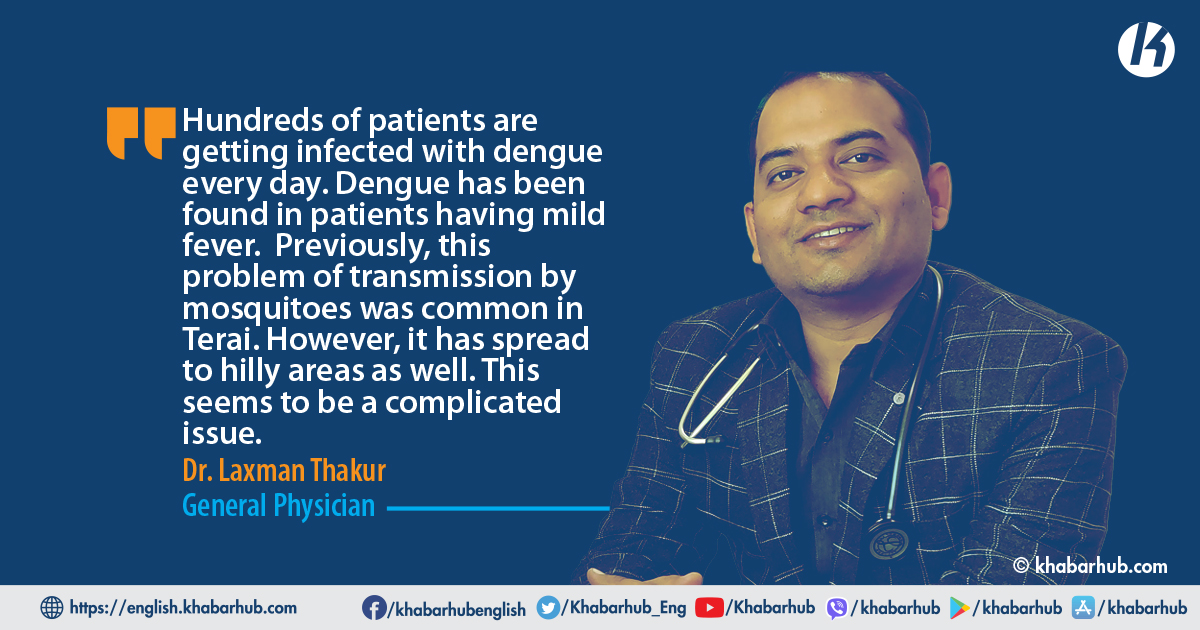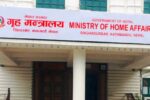KATHMANDU: Cases of dengue have been increasing all over the country lately.
With the increase of this disease, the number of patients in hospitals, too, has increased. In Nepal, it is estimated that it may increase for another three months.
Due to climate change, dengue has spread from the plains through the mountains to the Himalayas.
Based on this topic, Khabarhub’s Dhiraj Basnet approached Laxman Thakur, a general physician working at B&C Hospital. Excerpts:
How can we handle this dengue infection?
Hundreds of patients are infected with dengue each day. Dengue was also found in the patient who complained of mild fever.
Previously, this problem of transmission by mosquitoes was very common in Terai.
However, now many patients are seen in the hilly areas as well. This is likely to lead to a complicated situation.
Although it does not affect people in general, it is necessary to be aware because some dengue patients have severe problems.
As there is no separate treatment for dengue, there is concern that the situation will worsen as it progresses. Now with the onset of October, if it gets colder, it can be expected that the infection rate will decrease.
What kind of person will be more vulnerable to dengue?
Dengue fever goes through three stages. Initially, a fever that lasts from 3 to 7 days accompanied by pain in the eyeballs, and a red rash.
This also happens in normal situations. After this, some patients go from the fever phase to a critical phase.
Sometimes we have a problem related to dengue in such a patient and we categorize them into (dengue with a warning sign and dengue without a warning sign) for identification.
Warning signs include stomach pain and vomiting, body aches and breathing problems, and some people have severe headaches and even fainting.
From what we see from the lab, sometimes the number of platelets decreases after 4 to 5 days of dengue. Along with that, the blood becomes thick.
We have to admit such patients to the hospital and treat them. It happens even when patients with only normal symptoms take medicine and stay at home.
Plasma leakage is another symptom. It is caused by the leakage of plasma from the small veins through which our blood flows so that various parts of the body can get swollen, and the body is filled with water outside.
And, along with it, the pressure will decrease. This stage of dengue might be fatal.
In most of the hospitals in Kathmandu, more than 90 percent of the people infected with dengue are admitted. What’s the condition in Birtamod, the place you work in?
Dengue infection has also been observed in Birtamod. Dengue is seen in the people who came from Kathmandu and some hill districts rather than the locals of Birtamod itself. Not too terrible yet.
However, 15 to 20 percent of our current fever cases and dengue cases are admitted to the wards.
What symptoms need to be watched with cautiousness, and when should we go to the hospital?
As soon as the fever comes, we should check to see whether it is a dengue infection or not. Dengue infection is different from other fevers because even after the fever is cured, the infection can go into a critical phase.
After dengue infection is confirmed, fever should be checked regularly for a few days. The blood becomes thick. It has a warning signs, abdominal pain, bleeding from any part of the body, you should go to the hospital.
Some people say that infection may increase even more after Dashain. What do you say as an expert?
The number of recent outbreaks of dengue infection is high. As many people come and go from Kathmandu, it can spread.
Where do you think the government failed to prevent the spread of infection?
We should be aware of any disease transmitted by mosquito bites. We should also apply individual sprays that kill the larvae. It seems that the local government has also failed there.
What kind of food should one eat after a dengue infection?
There is no need to stop eating. You should eat food that is easy on digestion, you should eat food that does not cause constipation.
Once the dengue infection is cured, does it recur later or not?
There are 4 serotypes of dengue. If there is a previous infection serotype, it is not likely to cause an infection later. Any other serotype is likely to cause it.
What can we do to prevent the dengue infection now, what can we do to stop it?
Now we have to avoid mosquito bites and kill the larvae as much as possible. Early detection and treatment should be done as soon as possible.
Many people have to take medicines that they know. It is more likely to increase gastric, and blood pressures. Please do not take medicine without consulting a doctor.
What can be done to avoid dengue?
First of all, you should confirm what is causing the fever. Do not take any medicine other than paracetamol after fever. Paracetamol can be taken 4 to 6 times a day. Drink plenty of water and eat soft food.
Many people take medicines that they are familiar with. It is more likely to increase gastric and blood pressure. Please do not take medicine without consulting a doctor.









Comment